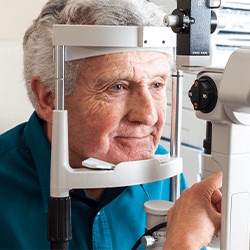Macular Degeneration near Kansas City, KS
What Is Macular Degeneration?
Macular degeneration, also known as age-related macular degeneration (AMD), is a medical condition that affects the macula, which is a small, sensitive area in the center of the retina at the back of the eye. The macula is responsible for providing sharp, central vision, allowing us to see fine details and perform tasks like reading and recognizing faces. Macular degeneration can lead to a loss of central vision, making it difficult to perform these tasks. Age is a significant risk factor for AMD, as it usually affects people over 50. Other factors like genetics, smoking, and a diet lacking in certain nutrients can also contribute to its development. There are two main types: dry (atrophic) and wet (exudative) AMD. With the dry type, the macula thins and breaks down slowly over time. It is more common and typically progresses gradually. The wet type involves the growth of abnormal blood vessels under the macula, which can leak blood and fluid, causing rapid vision changes.While there is no cure for macular degeneration, there are treatments available, especially for wet AMD, which can slow down the progression of the disease and sometimes even improve vision. Additionally, lifestyle changes, like quitting smoking and eating a healthy diet, can help reduce the risk. It remains important to get regular eye check-ups, as early detection and intervention can make a big difference in managing the condition and preserving vision. Contact a location near you, in Overland Park or Shawnee Mission, KS, or Belton, MO, to schedule an eye exam and take one step toward maintaining your eye health.
What Are The Symptoms of Macular Degeneration?
Symptoms of macular degeneration can vary depending on the type and stage of the condition. Common signs to watch for include:
- Blurred or distorted central vision
- Difficulty reading or recognizing faces
- Dark or empty spots in the center of your vision
- Reduced ability to see fine details, even with glasses
- Colors appearing less bright or vivid
If you notice any of these symptoms, it’s important to schedule an eye exam promptly. Early detection can help in managing symptoms and slowing disease progression.
How Is Macular Degeneration Treated?
Even though macular degeneration cannot be cured, there are treatments available that can slow the progression of and reduce your symptoms. The treatment available to you will depend on the severity of your condition and whether you have wet or dry macular degeneration. Some treatment options include:
- Supplements
- Low-vision aids (such as magnifiers)
- Laser procedures
In some cases, we may suggest combining two or more treatment methods.
Macular Degeneration FAQ
How can lifestyle changes impact the progression of macular degeneration?
Lifestyle choices can play a role in managing macular degeneration, particularly in slowing its progression. Factors such as quitting smoking, maintaining a healthy diet rich in leafy greens and omega-3 fatty acids, and regular physical activity can significantly impact the health of your macula. Additionally, protecting your eyes from excessive UV light by wearing sunglasses can help manage symptoms and potentially slow the deterioration process.
What are the early signs of macular degeneration that you should watch for?
Early detection of macular degeneration can be crucial in managing its progression. Some early signs to watch for include difficulty adapting to low light levels, increased blurriness of printed words, a decrease in the intensity or brightness of colors, and a blurred or blind spot in the center of your visual field. Regular eye exams are vital, as some forms of macular degeneration can start without noticeable symptoms.
How can regular eye exams help in managing macular degeneration?
Regular eye exams are essential for detecting macular degeneration early before significant vision loss occurs. During these exams, an ophthalmologist can look for signs of macular degeneration using comprehensive testing like visual acuity tests and detailed retinal imaging. Early diagnosis allows for timely intervention, which can include lifestyle adjustments and treatment options tailored to slow the progression of the disease and preserve as much vision as possible.
Manage Macular Degeneration
At Heart of America Eye Care, we are proud to have helped countless individuals with macular degeneration. Getting this diagnosis can be confusing and a little scary, but we are here with advanced methods to help preserve your eyesight and reduce any frustrating symptoms. For more information on macular degeneration or to schedule an eye exam, contact one of our locations in Shawnee Mission or Overland Park, KS, or Belton, MO.
* All information subject to change. Images may contain models. Individual results are not guaranteed and may vary.


